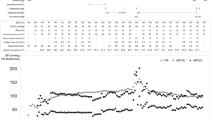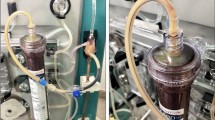Abstract
We present a case of severe hyperkalemia in a 48-year-old man after short-term infusion of an average dose of propofol. We suspected that the hyperkalemia in this patient was a sign of propofol infusion syndrome. The patient was undergoing a video-assisted esophagectomy, for which one-lung ventilation, with air/oxygen, isoflurane, and continuous epidural analgesia was supplemented with propofol infusion. In the intraoperative period, the patient developed severe hyperkalemia with mild acidosis but no cardiovascular failure. There were no other evident causes of hyperkalemia as documented by laboratory data. The procedure was abandoned and the patient was taken to postoperative recovery, where his potassium levels returned to normal at the end of 10 h.
Similar content being viewed by others
References
Burow BK, Johnson ME, Packer DL. Metabolic acidosis associated with propofol in the absence of other causative factors. Anesthesiology. 2004;101:239–241.
Liolios A, Guerit J-M, Scholtes J-L, Raftopoulos C, Hantson P. Propofol infusion syndrome associated with short-term large-dose infusion during surgical anesthesia in an adult. Anesth Analg. 2005;100:1804–1806.
Salengros J-C, Velghe-Lenelle C-E, Bollens R, Engelman E, Barvais L. Lactic acidosis during proprfol-remifentanil anesthesia in an adult. Anesthesiology. 2004;101:241–243.
Parke TJ, Stevens JE, Rice AS, Greenaway CL, Bray RJ, Smith PJ, Waldmann CS, Verghese C. Metabolic acidosis and fatal myocardial failure after propofol infusion in children: five case reports. BMJ. 1992;305:613–616.
Marinella MA. Lactic acidosis associated with propofol (letter). Chest. 1996;109:292.
Vasile B, Rasulo F, Candiani A, Latronico N. The pathophysiology of propofol infusion syndrome: a simple name for a complex syndrome. Intensive Care Med. 2003;29:1417–1425.
Koch M, De Backer D, Vincent JL. Lactic acidosis: an early marker of propofol infusion syndrome? Intensive Care Med. 2004;30:522.
Ahlen K, Buckley CJ, Goodale DB, Pulsford AH. The “propofol infusion syndrome”: the facts, their interpretation and implications for patient care. Eur J Anaesthesiol. 2006;23:990–998.
Author information
Authors and Affiliations
About this article
Cite this article
Mali, A.R., Patil, V.P., Pramesh, C.S. et al. Hyperkalemia during surgery: is it an early warning of propofol infusion syndrome?. J Anesth 23, 421–423 (2009). https://doi.org/10.1007/s00540-009-0745-4
Received:
Accepted:
Published:
Issue Date:
DOI: https://doi.org/10.1007/s00540-009-0745-4




